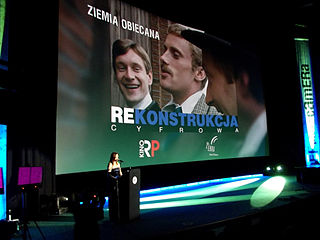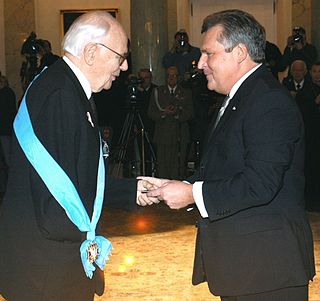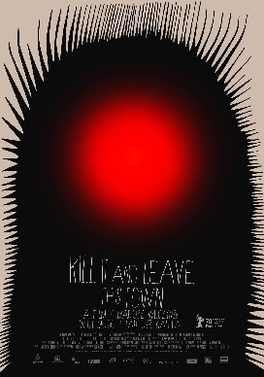
The history of cinema in Poland is almost as long as the history of cinematography, and it has universally recognized achievements, even though Polish films tend to be less commercially available than films from several other European nations.
In common with other European countries, the most frequent and most popular form of theatre in Poland is dramatic theatre, based on the existence of stable artistic companies. It is above all a theatre of directors, who decide on the form of its productions and the appearance of individual scenes. There is no strict division in Poland between theatre and film directors and actors, therefore many stage artists are known to theatre goers from films of Andrzej Wajda, for example: Wojciech Pszoniak, Daniel Olbrychski, Krystyna Janda, Jerzy Radziwiłowicz, and from films of Krzysztof Kieślowski, actors such as Jerzy Stuhr, Janusz Gajos and others.

Jerzy Oskar Stuhr is a Polish film and theatre actor. He is one of the most popular, influential and versatile Polish actors. He also works as a screenwriter, film director and drama professor. He served as the Rector of the Ludwik Solski Academy for the Dramatic Arts in Kraków for two terms: from 1990 to 1996 and again from 2002 to 2008.

Leon Stanisław Niemczyk was a Polish actor.

Agnieszka Osiecka was a Polish poet, writer, author of theatre and television screenplays, film director and journalist. She was a prominent Polish songwriter, having authored the lyrics to more than 2000 songs, and is considered an icon of Polish culture.

Piotr Szulkin was a Polish film director and writer. He directed over thirty films, both Polish and international productions. He was a recipient of "Best Science Fiction Film Director" at Eurocon in 1984. During the latter part of his career, he was also a professor at the National Film School in Łódź.

Jerzy Kazimierz Kłoczowski was a Polish historian, professor at the John Paul II Catholic University of Lublin, and former member of the Polish Senate. During World War II, Kłoczowski was a soldier of the Home Army and participated in the Warsaw Uprising, where he was seriously injured and lost his right hand. On leaving the military hospital in April 1945, he went to Adam Mickiewicz University in Poznań and then to Nicolaus Copernicus University in Toruń, where he earned a degree and a Ph.D. (1950). Member of the anti-communist Solidarity movement – after the fall of communism in Poland, Kłoczowski was elected Senator and member of the Commission for Foreign Affairs of the Senate, as well as the representative of the Polish Parliament at the Council of Europe.

Witold Sobociński was a Polish cinematographer, academic teacher as well as former jazz musician. Sobociński was a graduate of the renowned National Film School in Łódź. While in college, he was a member of the pioneer jazz band Melomani, in which he played the drums.

Krystyna Jolanta Janda is a Polish film and theater actress best known internationally for playing leading roles in several films by Polish director Andrzej Wajda, including Man of Marble and Man of Iron.

Bad Luck is a 1960 Polish black comedy film directed by Andrzej Munk. The screenplay is based on Jerzy Stawiński’s novel Six Incarnations of Jan Piszczyk (1959).

The War of the Worlds: Next Century is a 1981 Polish film by Piotr Szulkin which is inspired by the classic 1898 novel of H. G. Wells, The War of the Worlds. It was immediately banned by the Polish government upon its release because it depicted political parallels with the political context of the country at that time. It did not receive its premiere until 20 February 1983.

Interrogation is a 1982 Polish film about false imprisonment under the Stalinist pro-Soviet Polish regime in the early 1950s. The film was directed by Ryszard Bugajski and first released in 1989. The plot follows an ordinary, apolitical woman named Tonia, played by Krystyna Janda. She refuses to cooperate with the abusive system and its officials, who are trying to force her to incriminate a former incidental lover, now an accused political prisoner.

Henryk Bista was a Polish actor. He appeared in over 110 films between 1961 and 1997. He starred in the 1977 film Death of a President, which was entered into the 28th Berlin International Film Festival, where it won the Silver Bear for an outstanding artistic contribution. He was awarded many Polish film and state awards, including the Knight's Cross of the Order of Polonia Restituta (1984), the Gold and Silver Crosses of Merit and the Bronze Medal of Merit for National Defence (1968).
The City of Kraków Award is an award bestowed annually by the President of Kraków, Poland, for contributions relating to the city, and the popularization of its culture at home and abroad. It is given to prominent artists in the field of theatre, music, plastic arts and film, as well as to scholars and athletes. The applications can be submitted by the city cultural committee itself, as well as by art colleges, unions of art professionals, cultural institutions and publishers.

Mariusz Dmochowski was a Polish actor. He appeared in more than 45 films and television shows between 1958 and 1992.
The Polish Film Academy is a professional honorary organization dedicated to the advancement of the arts and sciences of motion pictures.

The Zbigniew Cybulski Award is a Polish annual film award given to best young Polish actors. It was established in 1969 on the initiative of Wiesława Czapińska and named to commemorate Zbigniew Cybulski who is widely considered one of the greatest Polish actors of the second half of the 20th century. It is among the most prominent awards in Polish cinema and the past winners include some of the most popular and critically acclaimed Polish actors. It was continuously awarded by the film magazine Ekran from 1969 to 1995 and after a ten-year hiatus it was reactivated in 2005 by the Kino Foundation. In 2008, the foundation published a book Być jak Cybulski?, which is devoted to all the past recipients of the award.

Kill It and Leave This Town is a 2020 Polish adult animated psychological horror film directed by Polish animator Mariusz Wilczyński, in his feature film debut, from a script developed alongside Agnieszka Ścibior. The film concerns a hero, fleeing from despair after losing those dearest to him, who hides in a safe land of memories, where time stands still and all those dear to him are alive.
Polish Legends, also known as Polish Tales, is a Polish-language science fiction and fantasy short film series, produced by Allegro and Platige Image. It was directed by Tomasz Bagiński, and written by Błażej Dzikowski and Dominik L. Marzec. In the production also worked Marcin Kobylecki, Łukasz Alwast, Krzysztof Noworyta, Tobiasz Piątkowski, Jan Pomierny, and Marta Staniszewska. The series include 5 short films, that premiered in 2015 and 2016, on YouTube. It is based on Polish legends and folk tales, including: Sir Twardowski, Wawel Dragon, Basilisk, and Baba Yaga.















